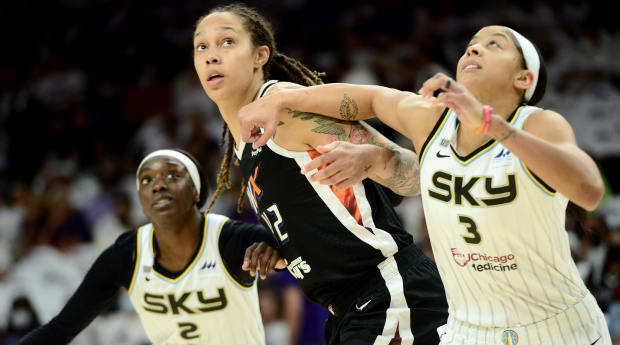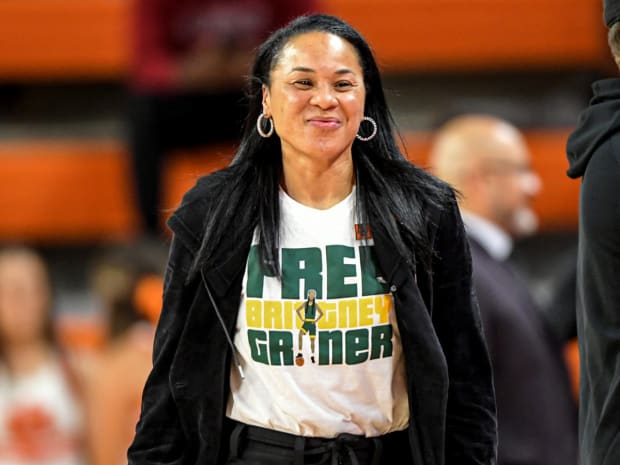Brittney Griner is finally home. For nearly 10 months, her name was linked to unhappiness and unsettled spirits within countless WNBA players, fans and other Americans. If her name did not already reverberate in your mind based on her sheer court wizardry for the Mercury, three words—#FreeBrittneyGriner—likely strengthened your perception of the eight-time All-Star.
Despite the climactic end of Griner’s Russian imprisonment, not everyone is jovial and radiating with smiles to see the eight-time All-Star reemerge in American society. Some are perplexed. Another faction can’t fathom that President Joe Biden orchestrated a prisoner swap deal for Griner’s return to U.S. soil that sent international arms dealer Viktor Bout back to Russia. There’s also concern for Paul Whelan, a former Marine who was also wrongfully detained who remains behind bars. Russia declined a deal for both Griner and Whelan to come home, because the 52-year-old is considered a different class of prisoner. Griner could have remained in barbaric prison conditions in Mordovia waiting on a deal for her and Whelan “that was not going to happen,” his twin brother said.
Think of Griner’s release as a three-prong flow chart with sports sitting crudely in between American patriotism and the crossfires of a geopolitical demolition unfolding across the globe. “She was a political pawn,” South Carolina women’s basketball coach Dawn Staley says.

Joe Camporeale/USA TODAY Sports
With Griner home, her first priority should be herself. But she also holds a pivotal key to unlatching the restraints on women’s basketball. “We’ve [WNBA and NCAAW] been handcuffed for decades,” Staley says. Griner was merely striving to do what she has loved since the ninth grade. After each WNBA season culminates, an overwhelming majority of league players voyage overseas and lace up their sneakers to play ball for behemoth paydays after already laying their bodies on the line for a 30-plus game season (40 in 2023), and even longer for those who partake in international competition for their respective nations. Griner was set to earn a league-maximum $227,900 as an annual base salary, with the potential to earn close to half a million in bonuses and marketing opportunities in the ’22 WNBA season.
By contrast, in playing for Russian powerhouse UMMC Ekaterinburg the last eight seasons, she reportedly earned $1 million per year, according to Jeff Metcalfe of The Arizona Republic. But when that opportunity was taken from Griner, women stood up and advocated for others to stand in the gaps for her during the darkest moments of her life.
Women’s college basketball has existed for 130 years. The W is coming off its 26th season, one of its most-viewed campaigns since Lindsey Harding and Noelle Quinn entered the league. Fifteen years later, during the 50th anniversary of Title IX’s ongoing fight for gender parity between men’s and women’s sports, Quinn is now a coach, guiding the Storm through the same tempest she faced.
So when will these conditions shift? “We have to build an economic model,” said WNBA commissioner Cathy Engelbert in a press conference after Griner’s release. “We’re working on that and studying history. We’re not 75 or 100 or 110 like some of the men’s leagues.”
Will the W grow in the way that the NBA did? The NBA had its kinks and phases of labor and bargaining issues. However, that league’s international strides played an influential part in the growth of the game. As such, like the NBA, the W plays a big part in soliciting the excitement and growth for the sport, especially for the increasing talent constantly brewing in the college ranks. It’s one thing for the coaches to want more; the players want more, too. But when college athletes deal with the disparity of an unfriendly fan environment like 10 teams did at the Las Vegas Invitational in November, what does that do in regard to improving the collegiate game?
Or what about when those athletes see Aces guard Kelsey Plum, newly elected to the players association, venting about the league’s pay structure and advocating for a larger revenue share? “We’re not asking to get paid what the men get paid,” Plum told The Residency Pod. “We’re asking to get paid the same percentage of revenue shared.” Those things—more player-marketing deals, media rights deals for the league, internship opportunities, coaching opportunities and broadcast network opportunities—matter now more than ever.
College athletes have the opportunity to capitalize on name, image and likeness deals, which are constantly evolving. But when their college careers end inside the confines of their universities, consider the number of athletes who hear their names called in the WNBA draft. Then consider the number of rookie and veteran players competing for one of 144 roster spots before the first preseason game. Not to mention, some WNBA rosters are more or less stacked with players—some franchise cornerstones—under contract. In what can be limited opportunities in the W, playing elsewhere becomes an attractive option for athletes—rookies or veterans. That also leads to the potential for problems arising between WNBA players overseas, like they did for Griner.
When Griner was detained, she was no longer only a WNBA player. She was not just another dominant, Black, lesbian athlete. She was a woman who went without hugging her wife, Cherelle, every day and night before bed. She likely missed interacting with her parents, Sandra and Raymond, and was left in complete silence from her WNBA community. Her primary communication came in the form of letters, her legal team and her agent as her situation worked its way through the intricacies of the U.S. State Department.
Griner’s absence was felt within both the W and the collegiate game. For Staley, who guided the Gamecocks to their second national title in a victory against UConn in April, she was exhausted from coaching her team—anchored by Aliyah Boston—and torn about Griner being away, describing last season as one that felt incomplete.
“I almost had to force myself to celebrate,” Staley says. “I thought about her when we were about to play a game and prepping for practice. I could pick up my phone and text a friend, but [Griner] couldn’t do that.”

Ken Ruinard/USA Today Network
Even with Staley’s demanding schedule, the legendary coach advocated for Griner’s release every single day like her life depended on it. She wore her “Free BG” pin and posted messages on social media that ignited others across both the WNBA and NBA to get involved, especially between July and November, when Griner was moved to a penal colony in Russia’s Mordovia region.
And players like Aces star A’ja Wilson, the former commander of Staley’s first national championship and a U.S. teammate of Griner’s, completed the journey to Las Vegas’s first WNBA title, under splashy new coach Becky Hammon, at that. But even then,the two-time MVP felt the absence of her sister BG. "Our league doesn't even feel the same without her,” Wilson said in August.
From the WNBA All-Star game, in which both teams wore Griner’s name and No. 42 on the back of their jerseys in the second half of the clash to the extensive blitz of outpuring emotions and gestures—#WeAreBG—from players and teams all year long, the efforts made by women—and some of their male colleagues—for Griner were immeasurable.
Breanna Stewart, Wilson, Diana Taurasi—Griner’s teammate in Phoenix—the Suns’ Chris Paul, the Lakers’ LeBron James, the Warriors’ Stephen Curry, WNBPA president and Sparks’ Nneka Ogwumike, Hammon and countless others used their platforms to call for Griner’s release.
Griner’s detainment should send a resounding message that change and investment are needed now. As the game grows, so should its resources. “We get the bare minimum,” Staley says. True enough, Rome was not built in a day. But effective change in any facet lies within relentless discipline and the confidence to want better. Time and time again, players in the W have stood in the face of adversity, fighting through America’s racial and social justice constraints as well as the gender pay gap.
The players are the pulse of this league. It’s time that they get the respect they deserve. Treat them as world-class athletes that they are. “Talent is everything,” Staley says. “You cannot do it without the players. … You can’t.” Imagine if athletes like South Carolina’s Boston, Iowa’s Caitlin Clark, Stanford’s Haley Jones, Notre Dame’s Olivia Miles and Maryland’s Diamond Miller—or even players who will come after them—have to withstand what Griner suffered through.
It’s time for Engelbert and the W to take a step further in the ultimate mission to grow the game. While WNBA expansion was slated to begin by the end of 2022, that has now changed. But, it should remain a priority going into the ’23 campaign. That would open the gateway to more roster spots, which means more opportunities that curb the need for players to dart thousands of miles away from their family and loved ones. That would drastically improve the outlook of the WNBA from college athletes as well as create more parity between men’s and women’s basketball.
“It took us decades to get us where we are with the men’s and women’s NCAA tournament,” Staley says. “Imagine if we brought in the same pool as the men’s NCAA tournament.”
Coaches like Staley and Stanford’s Tara VanDerveer have become staples of women’s college basketball because of talent, discipline and consistency. They are the voices of the sport. “I’m not going to coach as long as Tara, so somebody has to keep our game lifted in a way that it grows for the young ladies in our sport,” Staley says. Even Champ, Staley’s dog, barked in agreement. Staley adds: “We have not reached our peak as a sport … but we haven’t been given the fair chance to blossom in a way that other sports have.”







